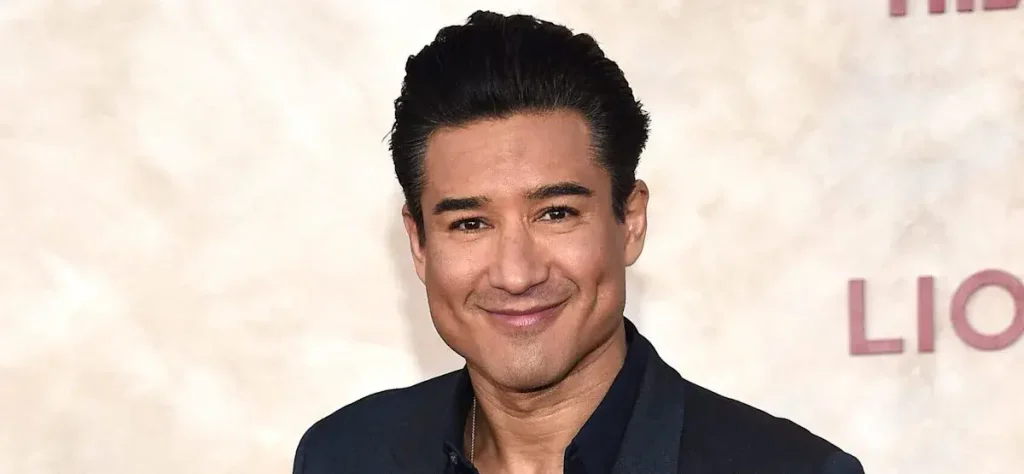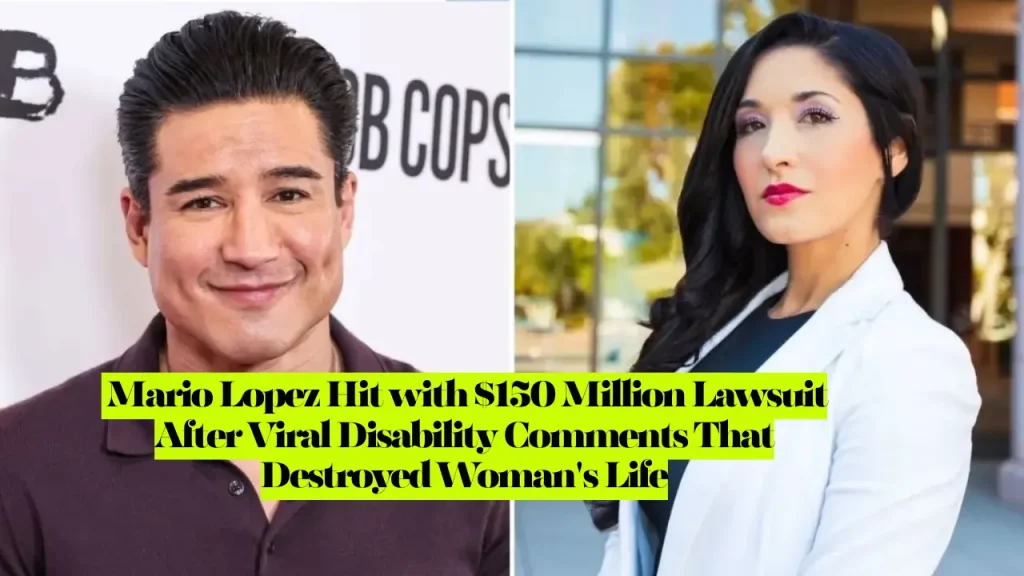Mario Lopez Hit with $150 Million Lawsuit After Viral Disability Comments That Destroyed Woman’s Life
What is the Mario Lopez Lawsuit About?
Mario Lopez, the beloved “Access Hollywood” host and former “Saved by the Bell” star, is facing a high-profile defamation lawsuit filed by Desiree Townsend, a former NFL cheerleader living with a rare neurological disability. The lawsuit stems from Lopez’s Instagram post where he shared a news clip and commented “There’s gotta be some kind of award for this performance,” allegedly implying that Townsend was faking her condition.
The case has captured national attention not only due to Lopez’s celebrity status but also because of the dramatic way the lawsuit was served – in a viral TikTok video that garnered millions of views.
Table of Contents
Key Details of the Mario Lopez Legal Case
The Incident That Sparked the Lawsuit
The controversy began when Lopez reposted a news broadcast clip featuring Townsend on his social media, adding commentary that suggested she was performing rather than genuinely experiencing a medical episode. However, Lopez implied she was faking it, given how perfectly normal she appeared weeks later.
Filing and Service Details
Townsend filed the lawsuit on June 13, 2025, and served Lopez two days later. The lawsuit, seeking $10 million, was served on June 15, 2025, at Lopez’s home. The service was captured in a viral TikTok video that has since become a social media phenomenon.
Escalating Damage Claims
The financial demands in this case have been inconsistent across reports:
- Initial reports mentioned $10 million in damages
- Later reports increased the figure to $25 million
- Most recent reports indicate Townsend is now demanding $150 million in damages
Legal Claims and Allegations
Primary Defamation Claims
The lawsuit accuses Mario of dehumanizing and defaming Desiree, a “woman living with a rare neurological disability.” She further claimed that the Access Hollywood host used the video to boost his engagement on Instagram.
Specific Allegations Include:
1. False Statements and Reputation Damage Townsend filed a lawsuit against him, accusing the TV host of using a false statement that severely harmed both her personal and professional reputation.
2. Emotional Distress According to reports, Townsend also alleged that she suffered “emotional distress” as a result of Lopez’s public commentary.
3. Professional Impact Townsend, a paralegal and CEO, alleges damage to her reputation, claiming the incident has affected her professional standing and business operations.
4. Comparison to Harvey Weinstein In her complaint, she also compared Mario’s actions, referring to the smear campaign, to those of Harvey Weinstein.
Related Lawsuit: Turtle WoW Lawsuit, Blizzard’s $1 Million Copyright Infringement Case

Recent Court Developments
Restraining Order Victory for Lopez
Mario Lopez has secured a critical victory: the court extended a restraining order barring Desiree Townsend from coming within 100 yards of him and his family until February 2027. This represents a significant legal development in Lopez’s favor.
Court Appearances and Reactions
Reports suggest that Mario Lopez ‘Completely Lost It’ At Cheerleader Suing Him During Explosive Court Appearance, indicating the emotional toll the case is taking on both parties.
Legal Context and Implications
Defamation Law Basics
In defamation cases involving public figures, plaintiffs must typically prove:
- The statement was false
- It was published to a third party
- It caused reputational damage
- The defendant acted with actual malice or negligence
Challenges in This Case
The case presents several legal complexities:
- Public Figure Status: Lopez’s celebrity status may require higher standards of proof
- Social Media Context: The role of viral content and engagement algorithms
- Disability Rights: The intersection of disability advocacy and free speech
- Restraining Order Impact: How the protective order affects the ongoing litigation
Timeline of Events
June 19, 2024: Original incident and Lopez’s Instagram post June 13, 2025: Townsend files initial lawsuit June 15, 2025: Lawsuit served to Lopez at his home (captured on TikTok) August 2025: Court extends restraining order until February 2027 Present: Case remains pending with escalating damage claims
What This Means for Both Parties
For Mario Lopez
- Legal Costs: Defending against a multi-million dollar lawsuit
- Reputation Risk: Potential damage to his television career and public image
- Restraining Order: Some legal protection from direct contact
- Career Impact: Ongoing scrutiny of his social media activities
For Desiree Townsend
- Legal Representation: Significant investment in pursuing the case
- Public Attention: Increased visibility for disability rights advocacy
- Financial Stakes: Potential for substantial damages if successful
- Charitable Commitment: Desiree, however, has stated that, should she win, the money would be donated to a charity for Women in Media

Frequently Asked Questions
What exactly did Mario Lopez say about Desiree Townsend?
Mario added the commentary “There’s gotta be some kind of award for this performance” to a news clip featuring Townsend, suggesting she was acting rather than experiencing a genuine medical episode.
How much is Mario Lopez being sued for?
The amount has varied in reports, ranging from $10 million initially, to $25 million in later reports, and most recently $150 million in damages.
When was the lawsuit filed and served?
Townsend filed the lawsuit on June 13, 2025, and served Lopez two days later on June 15, 2025.
What is Desiree Townsend’s background?
Townsend, a paralegal and CEO, is also a “woman living with a rare neurological disability” and former NFL cheerleader.
Has Mario Lopez responded publicly to the lawsuit?
The case is pending, with no public response from Lopez, and the claims remain unproven.
What protection does Lopez have?
The court extended a restraining order barring Desiree Townsend from coming within 100 yards of him and his family until February 2027.
Expert Legal Analysis
This case highlights several important legal principles:
Social Media Liability: The lawsuit demonstrates how casual social media comments can lead to serious legal consequences, especially when involving individuals with disabilities.
Celebrity Responsibility: Public figures must be increasingly careful about their online commentary, as their platforms amplify potential harm.
Disability Rights: The case intersects with disability advocacy, potentially setting precedents for how society discusses and portrays individuals with neurological conditions.
Viral Content Consequences: The viral nature of both the original incident and the lawsuit service shows how quickly legal matters can become public spectacles.
What’s Next in the Mario Lopez Lawsuit?
The case remains active with several potential outcomes:
- Settlement Negotiations: Both parties may seek to resolve the matter privately
- Trial Proceedings: If no settlement is reached, the case will proceed to court
- Appeals Process: Regardless of the initial outcome, appeals are likely
- Public Interest: Continued media attention will likely influence both legal strategy and public perception
Conclusion
The Mario Lopez lawsuit represents a significant legal battle that extends beyond typical celebrity litigation. The financial stakes in this lawsuit are monumental, with implications for social media responsibility, disability rights, and celebrity accountability.
As this case continues to unfold, it serves as a crucial reminder of the real-world consequences of online commentary and the importance of considering the human impact of viral content. The outcome will likely influence how celebrities and public figures approach social media engagement in the future.
The legal proceedings remain ongoing, and both parties continue to navigate this complex intersection of defamation law, disability rights, and social media responsibility. As new developments emerge, this case will undoubtedly continue to capture public attention and potentially establish important legal precedents.
This article is based on publicly available information and court records. Legal outcomes remain pending, and all parties are presumed innocent until proven otherwise in a court of law.
About the Author

Sarah Klein, JD, is a licensed attorney and legal content strategist with over 12 years of experience across civil, criminal, family, and regulatory law. At All About Lawyer, she covers a wide range of legal topics — from high-profile lawsuits and courtroom stories to state traffic laws and everyday legal questions — all with a focus on accuracy, clarity, and public understanding.
Her writing blends real legal insight with plain-English explanations, helping readers stay informed and legally aware.
Read more about Sarah
